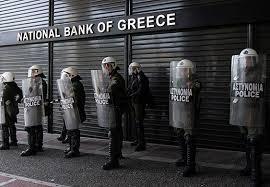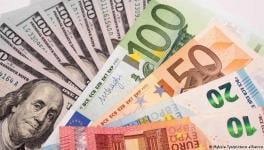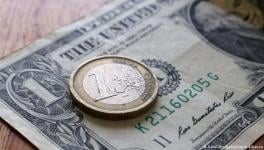The Hidden Truths Behind The Greek Drama
Greece was the civilization where drama and farce were established as forms of theatre. The negotiations with the Eurozone were a drama for the Greek people, and a farce for the European leaders. In fact, it is a dramatic for all, that this brings to an end of the most radical dream after the Second World War. Let us see why. It will be a little long, but without examining a little history it is impossible to understand how we came to this situation.
The Media have been presenting the German-led diktat to Greece, as a cultural difference, between the hard working ant and the irresponsible grasshopper, from the Aesop’s tales, plus the work ethics of the Protestant north versus the Catholic south (Greeks are orthodox Catholics). Those are realities, but this leaves out important truths.
First of all, let’s recall that the euro was a political design, not an economic project. It came out of an agreement hashed out between Mitterrand and Kohl. Those afraid of the power from a reunified Germany (I like Germany so much that I prefer to have two; quipped the French President), asked the German chancellor to abandon the very strong German Mark, and accept a European common currency, so that Germany’s destiny would be forever integrated with other European economies.

Image Courtesy: flickr.com
Kohl, who like all leaders of the time (Thatcher excepted) was genuinely committed to European integration, accepted the idea, and even agreed that the first Governor of the European Central Bank would not be a German, as his electorate would have preferred. For Germans to abandon the Deutschmark was a strong psychological sacrifice, after their painful experiences of financial instability. Kohl acted as a European statesman, at great personal cost with his electorate: something today is simply unimaginable.
The design of the euro was clearly incomplete, without fiscal unity and further financial integration. But at the time, everybody thought that the euro would automatically accelerate European integration. Just a year before, in 1989, the Berlin Wall came down, and nobody could foresee how the end of the communist threat would change politics within the capitalist world.
In the years after the introduction of the euro (2002), a larger and stronger Germany did increase its strength, thanks also to market reforms done under Schroeder, bringing with them some difficulties to the poorest Germans. This left the country with the conviction that they had made their share of sacrifices, that austerity did work, and that it was the recipe for crisis. German became a net exporter inside the European Union, it used its surplus to further expand internally. Germans sees this surplus as a result of their sacrifices and fruit of their labour, and so do not look kindly on countries in deficit. The common street comment is: why should my money go to people who were not able to run their own country?
It is here that you can see the difference between statesmen and politicians. Merkel (who by the way emerged from Kohl’s political influence, who was her mentor, and was central in his expulsion from politics) never tried to educate her electorate to a European vision. So few Germans understand that their wealth is coming in great part from European consumers (who are also European citizens). Their attitude with the bailout of miniscule Cyprus was one of complete intransigence. And there was never any effort from the German authorities to explain their citizens that they too were in the same boat.
It is fair to stress that Merkel is by no means alone in riding on the popularity of nationalist sentiment. The same thing is happening all across Europe. The period marked by De Gasperi, Adenauer and Schuman is over. In the EU we have gone from Delors to Juncker. Vision and idealism have given space to national interest and the EU is now seen more as a cow to milk. The unspoken drive for the enlargement of the European Union to 28 countries has been driven by one thing; money.
The euro has therefore become a straitjacket for countries in deficit, and a power tool for those in surplus as the Nobel Prizewinner Paul Krugman wrote in the New York Times, describing the euro as a Roach Motel, a trap once entered, one can never escape. Greece is 2% of the European GNP. But it is the same mechanism , the lack of union and solidarity, where it has until now proven impossible for a region of 450 million people to agree on how to receive 40,000 refugees, many from countries like Syria and Libya, in whose destruction Europe has direct responsibility. This mechanism has been playing havoc with Greece.
The creditor countries insist that Greece has already received two bailouts: one in 2010 for 110 billion euro, on the condition that it would eliminate is deficit, and another in 2012, for 220 billion. What has been largely unreported is that those loans were disbursed under a strict control of the BCE, the IMF and the EU, who made sure that 80% would go directly to the European banks who had previously invested in Greek bonds, because they were the most profitable euro area bonds.
German and French banks were the most exposed. Only 20% went to the Greek economy. The austerity which come with the loans, has brought a social and economic devastation. The other countries which also received a bailout with the austerity program attached (Spain, Portugal and Ireland) have lost 7% of their GDP in the crisis. Greece has lost 26% of the GDP. Salaries have been depressed by 14%. Greece is the only country of the EU were the minimum wage has decreased. Unemployment is at 26% (youth unemployment at 50%). Over 75% of the unemployed has been so for over a year. According to OECD, one person in five cannot afford a meal. Homelessness has tripled in the last two years. 40.5% of minors are now in poverty.
There is no need to be a Nobel Price like Krugman and Stiglitz to observe that a progressive and complex adjustment is required in a country with little industrialization, a bloated bureaucracy and poor productivity, where years of mismanagement and corruption have to be corrected, where tax evasion is rife and welfare inflated,. The austerity recipe was that in two years from 2010 to 2012, the budget should be in parity. In the last five years, Greece has cut cost and increased taxes for 30% of the GNP.
No other European country has been able to do this. But as you study in the first year at university at economic studies, the GNP is made by four items: public investments, which have disappeared; trade surplus, which was never a Greek condition; investments in the research, education and health sectors which have regressed several decades, and finally, by local spending, which has come to a halt.
How can a budget be balanced by just cutting expenses and salaries? How you can solve fiscal evasion in a few months? It is not a coincidence that in five years six parties have been in government and the country has been led by four prime ministers (five, if you include an elected caretaker).How Syriza was supposed to solve everything in a few months?
When Greece did join the euro, everybody knew that their statistics were doubtful. The ECB governor, the Dutchman Duisenberg, even sounded an official alarm. But those the times of the fat cows.
Greece was the cradle of Europe, a small economy, so nobody cared. Then, in 2004, the center-right wing Karamanlis come to power, and found out that the budget deficit was not of 1.5% but 8.3%. He decided to keep this a secret, as the Olympic Games were returning to Greece, where they were born, that August.
By that time the budget, of course, had become unsustainable, and in 2008 the country’s tax collection (which was already a disaster, as it left out the rich and only taxed those on a fixed salary) collapsed. The hole in the budget became too large to hide. In 2009 the country’s credit rating was downgraded, first by Fitch and then by Moody’s. The cost of borrowing spiked, and European banks found out that there Greek bonds were losing value from day to day.
So, in 2010 a first loan was given, under the absurd condition to bring about a swift balanced budget in two years. Cuts in all sectors of the country brought huge demonstrations and, in 2011 alone three governments followed. In 2012 the socialist Georgios Papandreou accepted a second loan, with the same conditions of austerity. And of course, the situation became even more untenable, as the social disaster was aggravated.
Now it is interesting to read Tim Geithner memories, “Stress Test, Reflections on financial crisis”, which come out in 2014. Geithner was Secretary of Treasury in the first Obama government. United States recovery from the crisis is due to the fact that instead of taking the path of austerity took the path of growth, albeit partly.
The American government has been always trying to convince the Europeans to abandon their fixation with austerity. So Geithner, at the time of the second bailout, went to visit the minister of finance of Germany, Schaeuble, the champion of the austerity economic theory.
Schaueble is, by the way, a lawyer, not an economist, so he knows more about rules than he does about the economy. Geithner found Schaueble convinced that Greece had to go, as a message for the other debtor countries, especially France and Italy.
His point was that there was a need to redefine the European design, by making it more homogenous and under strict common rules. In other words, instead of a European Germany, as was the vision of Adenauer, Kohl and Schmidt , Schaueble wanted a German Europe. He was totally opposed to the second bailout, as he did not trust the Greeks as able to bring their budget in parity. He was overruled by Merkel with great difficulty.
In September 2014, then Prime Minister Samaras flew to Bonn to appeal to Merkel. He explained that the unpopular economic measures that Greece was required to enact, were feeding the rise of a radical left wing party, Syriza. Merkel totally ignored him, and advised him to go ahead with the reforms right away. In January Alexis Tsipras was elected by an exasperated electorate.
A lot has now been written on how Syriza Minister for Finance, Varoufakis, as a Marxist economist, confronted all his European colleagues. How the referendum called by Tsipras on the Euro was considered a mistake by Merkel and the other creditors.
How the referendum was held in a campaign of fear, with appeals to the Greek voters from the President of the European Commission, Juncker, to the President of the Eurogroup, Dijsselbloem, to the vice premier of Germany Gabriel, and so on: in other words, from conservatives and social democrats.
The ECB did shut down the flow of money to Greece, contrary to its rules, aggravating the climate of fear. What went unnoticed was a political analysis of the referendum and the arrival of Tsipras himself, which was more relevant than Greece itself.
The world’s spokesman in economic circles is, by general consensus, the Wall Street Journal. While the New York Times wrote an editorial to criticize the austerity fixation of Europe and the selfish role of Germany, the WSJ on the 6th of July wrote an editorial commenting on the referendum, recommending that it would be better to have a euro exit than to risk of anti-reform political contagion. The editorial said that unless the political contagion is stopped, parties of the left in Italy, Portugal and Spain will have a new argument to make against the reforms that have begun to show some progress […]
This could doom the center-right Spanish government of Mariano Rajoy as it goes to the polls later this year”. On the 7th another editorial indicated that a victory of Tsipras would strengthen Podemos in Spain, and that the left wing Irish party, Sinn Fein, has also started to use Tsipras for their internal campaign. On the 8th of July the authoritative Holman Jenkins J. said it openly: “Portugal, Italy and Spain, core European welfare states, have already made the same transition to dependence on external other people money “to uphold their welfare systems”.
Therefore, the defense of Greece from a usually subjugated France, is obvious: is a welfare state defending the European welfare system against the reforms that the neoliberal system requires. Jochen Buttner, the political editor of Die Zeit, the weekly conservative, repeats the same arguments: Why Greece needs to go, in an opinion published by the New York Times.” Unemployment in Italy, Portugal and Spain remains high, and anti-European Union populists are on the rise in all three.
The conclusion that people there could draw from a third bailout for Greece would almost certainly be that voting for radical parties and obstructive behavior are eventually rewarded.”
There is therefore an open call for a change of government in Greece, and a punishment for its citizens, who have ignored all the appeals from the European leaders, to avoid a political contagion. This is a far cry from the idea of European solidarity, and “an ever closer union”, as the EU charter states. It is a precise definition of which Europe the system in power wants. And the system has no problem with double standard.
Let us look to Ukraine, who has just asked for a bailout, that IMF estimates this to be of the order of 60 billion dollars. While the Greek deficit is a result of mismanagement, the Ukraine’s one, as is widely known, is a result of embezzlement and corruption.
The government, with support from the IMF, is asking for a haircut (or a partial cancellation) of its debt. According to Andrew Kramer of the New York Times, negotiations have been opened on this point. Merkel has been very adamant: no haircut to Greece, even if the IMF has clearly stated that there is no possibility that Greece will pay its debt, which is now at 200% of its GNP (no wonder, considering that they have to repay 240 billion dollars of the two precedent bailouts).
The IMF has even threatened not to become involved in the implementation of the third bailout, if a reduction of the deficit is not taken. The third bailout is couched in the most humiliating terms, by even suggesting the liquidation of 50 billion euro of Greek national assets, into a fund administered under the creditor’s control. Germany wants to wash its hands from that implementation, and prefer IMF to do the dirty work.
The Greek saga is not over, and it will last for many years, as the austerity project is removed from reality, and as things are, will only make things worse. National egotism will clearly come to light. But something is already now clear. The European project has radically changed. It is not based on solidarity and union, but on money and markets.
And the euro, which was supposed to be the point of departure for further integration, is now a mechanism which as Krugman says, will exasperate the gap between the strong and weak countries. Now Europe has to face the possibility of a Brexit, with the British referendum on its permanence in Europe. Merkel has already made positive noises on Cameron requests, including changing Europe’s constitution. The new Europe, led by Germany, will be based only on economics, with a reduction of the welfare state, little concern for social issues and growing social inequality.
A year after the first Greek bailout, in 2011, at the annual convention of its party, in Leipzig, Volker Kauder the leader of the CDU in the German parliament, noted to great applause: “all of a sudden, Europe speaks German. Not in the language but in the acceptance of the instruments for which Angela Merkel fought so long and so successfully”.
An assertive Germany has continued to grow since then, and in March a prominent Berlin political scientist, Herfried Munker, published a book “The power in the middle”, which was a great success. Germany, he wrote, has the duty to lead Europe, because neither Brussels nor another EU country is strong enough to do so
Gone are the lessons of history. Germany was deeply humiliated by the Versailles treaty after the end of the First World War, and this brought Hitler to power. Greece, of course, is a small country, so its humiliation is no threat. But Greece did vote at the end of the Second World War, in favor of cutting the German debt by 40%.
The question is, therefore: If it is a good reading of history to think that to lead Europe imposing on everyone one’s internal model as the only reality or whether this leads to stresses and tensions? It is high time that Germans start to ponder this question.
Roberto Savio is the Founder and president emeritus of the Inter Press Service (IPS) news agency and publisher of Other News
Disclaimer: The views expressed here are the author's personal views, and do not represent the views of Newsclick.
Get the latest reports & analysis with people's perspective on Protests, movements & deep analytical videos, discussions of the current affairs in your Telegram app. Subscribe to NewsClick's Telegram channel & get Real-Time updates on stories, as they get published on our website.
























